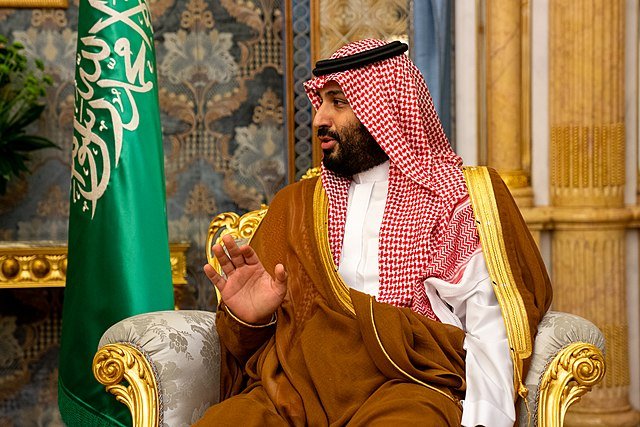Shifting Sands of Diplomacy: Israel-Saudi Normalisation and the Palestinian Predicament
Photo courtesy of the US Department of State
The complex landscape of Middle Eastern diplomacy has been highlighted through recent talks of the Israel-Saudi normalisation, brokered by the U.S., and its implications for Palestine. The normalisation would benefit all three actors in their foreign policy goals: it would support Israel's integration into the Middle East, provide Saudi Arabia with extensive U.S. security guarantees, and assist the U.S. in countering China's growing ambitions. The recent escalation of the Hamas-Israel war highlights the complex interplay, prompting a reevaluation of Saudi Arabia's foreign policy and its pursuit of a U.S. defence pact and civilian nuclear plant, with profound implications for the dynamics of the Middle East.
The potential deal holds numerous implications for the Palestinians. On one hand, normalisation could diminish their leverage in future negotiations, with representatives already feeling excluded. This may signal a shift of historical support from the Arab nations towards Israel, which would cause a deeper sense of abandonment and isolation amongst the Palestinians and could hinder their pursuit of statehood and a viable resolution to the war. Moreover, closer cooperation could also lead to greater measures against Palestinian militant groups. Furthermore, there is the risk of increased pressure on the Palestinians to accept the status quo without meaningful concessions from Israel, with Netenyahu having told Bloomberg TV that any gestures he might make towards Palestine would be 'just a box you have to check to say you're doing it'.
However, recent developments concerning the escalating regional tensions have led to a shift in Saudi's stance on the normalisation process. Fundamentally, the concessions towards Palestine are being questioned as the state is currently under total siege, with Israel cutting off all water, electricity and food. There have been calls for Israel to halt settlement expansion following the blockage of borders and incessant retaliatory attacks. The Gaza Health Ministry has announced that there have been over 2750 Palestinian deaths since October 7 with over 9700 injured. Saudi’s Crown Prince has refused to condemn Hamas’ attack on October 7th and has frozen talks of normalisation, demanding an end to the Gaza siege and a halt to US backed military operations. Saudi Arabia has reverted to its 2002 peace plan which calls for complete Israeli withdrawal from Palestine. The war has forced Gulf states with Israeli ties to reinforce their commitment to the Palestinian cause with leaders raising money for humanitarian aid.
Riyadh is not the only player demanding concessions to the Palestinians, with the U.S democratic senators demanding halts to settlement expansion and annexation on the West Bank, which has caused unrest following Netenyahu’s plans for greater expansions of Israeli settlements. Their demands are integral to creating a conducive environment for peace negotiations and addressing the long standing conflict. It is noteworthy that any chance of a pact being signed needs the approval of at least two thirds of the Democrats. However, the recent decision by Saudi Arabia to pause the process of normalisation has cast uncertainty. The senators' concerns have been twofold: the potential of the pact succeeding without substantial Israeli concessions and its implications for American support. The recent delays in the U.S.-backed talks carry substantial implications concerning the future of a defence pact, emphasising the importance of cooperating with Palestine to further Washington's outreach in the Middle East as well as maintaining an attractive relationship with Riyadh.
The potential normalisation also carries significant geopolitical implications. One key aspect is the concern of the gulf states in regards to the potential involvement of Iran in the Israel-Hamas conflict. The Crown Prince Mohammed bin Salman has been said to have engaged in talks with the Iranian President Ebrahim Raisi, an outreach which has underscored the urgency of addressing the turmoil and has signalled a transition from diplomatic relations with the U.S. If Saudi Arabia signs the pact, it has potential to incite a broader regional war with Iran warning that they’ll initiate a ‘preemptive’ strike against Israel very soon. Furthermore, this emphasises Saudi Arabia's commitment to Palestine and regional stability. The evolving dynamics in the Middle East are intertwined with the trajectory of the normalisation process. Fred Kempe, CEO of the Atlantic Council, said that there is now ‘zero chance’ of any normalisation deal due to Israel’s attacks that have caused concern from global humanitarian organisations.
As Saudi Arabia rapidly reevaluates its foreign policy, the potential outcomes are multifaceted. The need for Israeli concessions and the urgency of addressing the regional turmoil has only intensified with the talks between Riyadh and Iran serving as a turning point. The implications of normalisation are profound, with threats of further regional instability and a shift in relations between the gulf states, Israel, and the U.S. The situation is volatile and as more regional actors come into play, the path forward remains uncertain.

